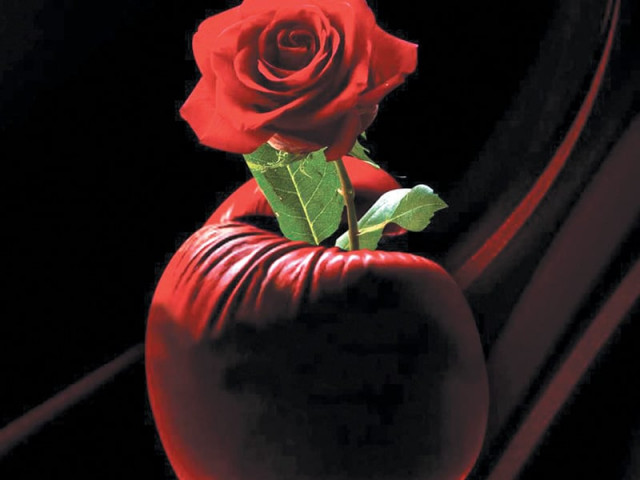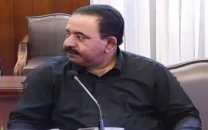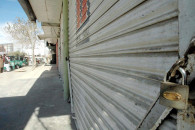Karachi: The Musical - fight night
Karachi is the ultimate comeback kid and now this mean and marvellous metropolis can boast a musical of its very own.

Inside the rehearsal space, where one can usually catch performances by underground bands, I am told to take a quiet corner since an acting exercise that requires immense concentration is underway. About 20 young people are sitting in a wide circle with their backs to each other. Eyes shut tight, they passionately deliver their lines but the director is still not satisfied.
“Guys, this is not a joke — it’s an exercise! Keep your eyes closed and try to listen to each others’ characters!” shouts Nida Butt, the lady behind the smash hits, “Mamma Mia” and “Chicago” in Pakistan. “Karachi: The Musical”, originally titled “Lyari: The Musical”, is the director/choreographer’s latest production. An original Urdu play by Made for Stage productions, it deviates from Nida’s previous offerings — which have been faithful reproductions of famous musicals — but the director brings the same intensity and passion that were evident in “Chicago” and “Mamma Mia” to “Karachi: the Musical”. Made for Stage Productions, incidentally, is the only theatre company that stages live I am about to strike up a conversation with Nida when, all of a sudden, the actors shuffle to their feet and disperse. Each is now writing a sketch of his or her own character in the play. It’s a mixed crowd, comprising of actors from Nida’s previous productions, who hang around conversing in fluent English, and are clearly at ease with her novel methods. Then there are the well-trained and experienced Arts Council and Napa graduates, instantly recognisable as they crack jokes in street lingo and trade gossip and stories about their respective institutions and teachers, many of whom are household names in the theatre world. Perhaps appropriately for a play about Karachi, it’s clear that both burgers and bun kebabs are well-represented in the cast.
One of the actors from the Arts Council has previously performed in the Urdu adaptation of Kleist’s “The Broken Jug” and is clearly excited by this new exercise. “I’ve written this character sketch in Urdu, since I play a typical mullah. You know, the hypocritical kind who doesn’t practice what he preaches,” he says with a grin.
The lead actor, Imam Syed, can be found in a corner rehearsing a scene with another actor. Playing an amateur boxer from Multan, he is pleading with a renowned coach from Lyari to train him to be the world champion. It’s a powerful scene and I watch mesmerised. When Syed finishes up with practice, he wolfs down an apple. “I need to tone up my muscles for the performance,” says the dedicated actor. Clearly, even snack choice is determined by the role.
The actors’ excitement about their roles is palpable, and the Napa and Arts Council graduates are as excited about the prospect of going to Dubai for performances as they are about the play itself. One of them takes me aside and exclaims, “Rafay Bhai, these plays are much better than what Zia Mohiyuddin does.”
The person I’m really looking forward to seeing today is Co-Ven frontman Hamza Jafri. A master of his genre — which happens to be progressive rock — the Lahore-based Hamza has a cult following thanks to Co-Ven’s brilliant music; the song Sailing Fast with its tongue-in-cheek video is a particular favourite among fans. Hamza is co-producing the musical alongside Nida and has been working for over a year on the music. “Making a musical about Karachi requires quite a bit of soul-searching,” he says. “Pinpointing the traits that define this metropolis and then putting them to music and lyrics is no mean feat.”
For her part, Nida believes it is resilience that defines the spirit of Karachi. “The chowkidar who opens our gates, the vendor who sells us fruit, the labourer who builds our houses, the ordinary man’s struggle and desire to achieve something, despite the turmoil — this resilience is the inspiration behind the story. One of our songs from the play has the line ‘Karachi ghareebon ke sahara, hai chal raha’ which encapsulates the character of the metropolis. This musical is a tribute to those who make this city functional, day after day, irrespective of whether there is paani or bijli,” says Nida. Clearly, the play itself is something of a labour of love for Nida.
Wishing to draw out the thus-far silent Hamza, I wonder out loud if there is a single musical instrument that defines the true spirit of Karachi. “Not really,” he says, looking out at the Zamzama traffic through a window. “Karachi is a whole orchestra. The sound of Karachi is the sound of generators, ambulances, gunshots, auto rickshaws, blasts, riots, protests, celebration, festivity — and we have all of this in our ensemble orchestra.”
Hamza draws a clear distinction between his hometown of Lahore and Karachi, a city that truly excites him. “In Lahore, the man on the street and the one driving a Pajero are one and the same, in terms of their character and tastes. The latter is just more affluent,” says Hamza. “But in Karachi if you go on the streets of DHA, you’ll find hard-rock music being played in car woofers and when you get to Lighthouse, you’ll find ethnic pop being played with the same spirit.”
It’s that spirit that Nida and Hamza Jafri have tried to infuse into the musical itself. They enthusiastically state that the audience should expect two and a half hours of pure entertainment. While the story is based in the Karachi of today, the musical focuses on the long-neglected sport of boxing. It’s a tale of aspirations, betrayal and triumph which ends with a message of hope. But haven’t we heard this story before? Is this just going to be a Pakistani version of Rocky or Resurrecting the Champ?
“I wouldn’t say it’s anything like Rocky,” counters Nida. “The only common thread between us and Rocky is boxing and God knows there have been many more movies on boxing. There is also more than one hero in this musical but ssshhh! I don’t want to give too much away,” says Nida who clearly wants to save her best right hook for the opening show.
But the Nida Butt that theatre enthusiasts know is the one behind local productions of foreign musicals — an Urdu musical is the last thing one would expect Nida to do. Couldn’t this turn into a disastrous experiment rather than an innovative theatrical experience?
“This is just what I’d like to hear,” says Nida. “I wouldn’t waste my time on doing something that wasn’t far-fetched.”
Hamza is also ready to jump into the ring, saying he considers this play a great opportunity to challenge himself and explore himself further as a musician. “The music in my albums is the story I want to tell and shows the way I look at things. But to create music for an existing script required me to take a backseat and listen to everyone else, which makes it a different ballgame altogether,” says Hamza.
Two songs have been released so far from the musical and fans can’t wait to get their hands on the rest. According to Hamza, the music is a mix of rock opera, desi and Big Band jazz. Hamza plans to introduce a lot of programmed horns on the keyboard and a number of percussive instruments onstage for which the platform has also been extended.
“Almost a year back, Nida showed me a documentary on the boxers of Lyari and from there I picked up elements like triumph, the adrenaline rush and a lot of action. When I started to go through the script, it evolved into something very grand with an ethnic pop influence,” says Hamza.
This synergy doesn’t just end with the cast and the music, and Hamza waxes lyrical about the contributions of scriptwriter Faraz Lodhi, who is himself a well-known underground musician. “If the writer of a musical is a musician himself, it becomes easier for the composer and Faraz was a great help.”
Making the untrained actors sing for the live musical performance was no mean task but Hamza is satisfied and is keeping his fingers crossed till the show goes on stage. “Everyone has given it their best. Many of the cast members have evolved from being nowhere to actually singing well — let’s hope for the best.”
The musical is already scheduled for an all Pakistan tour in March 2012 and, if everything goes smoothly, possibly a performance in Dubai by the end of 2012, which the Arts Council crowd is very excited about.
“Karachi: The Musical” is likely to be a turning point in modern-day Pakistani theatre. The audience has seen live musicals with classical music instruments, largely lip-synched local productions like “Bombay Dreams” and countless other adaptations and translations. When Nida Butt brought musicals from other countries to Pakistan, she was accused of plagiarism and duplicating the filmic rendition of those plays but soon others followed in her footsteps. The big question is, will they do the same with an original script and music?
Nida has a few words for her critics as she nonchalantly pats her pet dog, Gabbar, “I wish it was as easy as opening a laptop and duplicating the scenes. It never was that simple — which is why I am now doing an original musical with live music. It’s time we show the world that we have more to offer than cricket and fashion.”
Published in The Express Tribune, Sunday Magazine, October 23rd, 2011.



















COMMENTS
Comments are moderated and generally will be posted if they are on-topic and not abusive.
For more information, please see our Comments FAQ